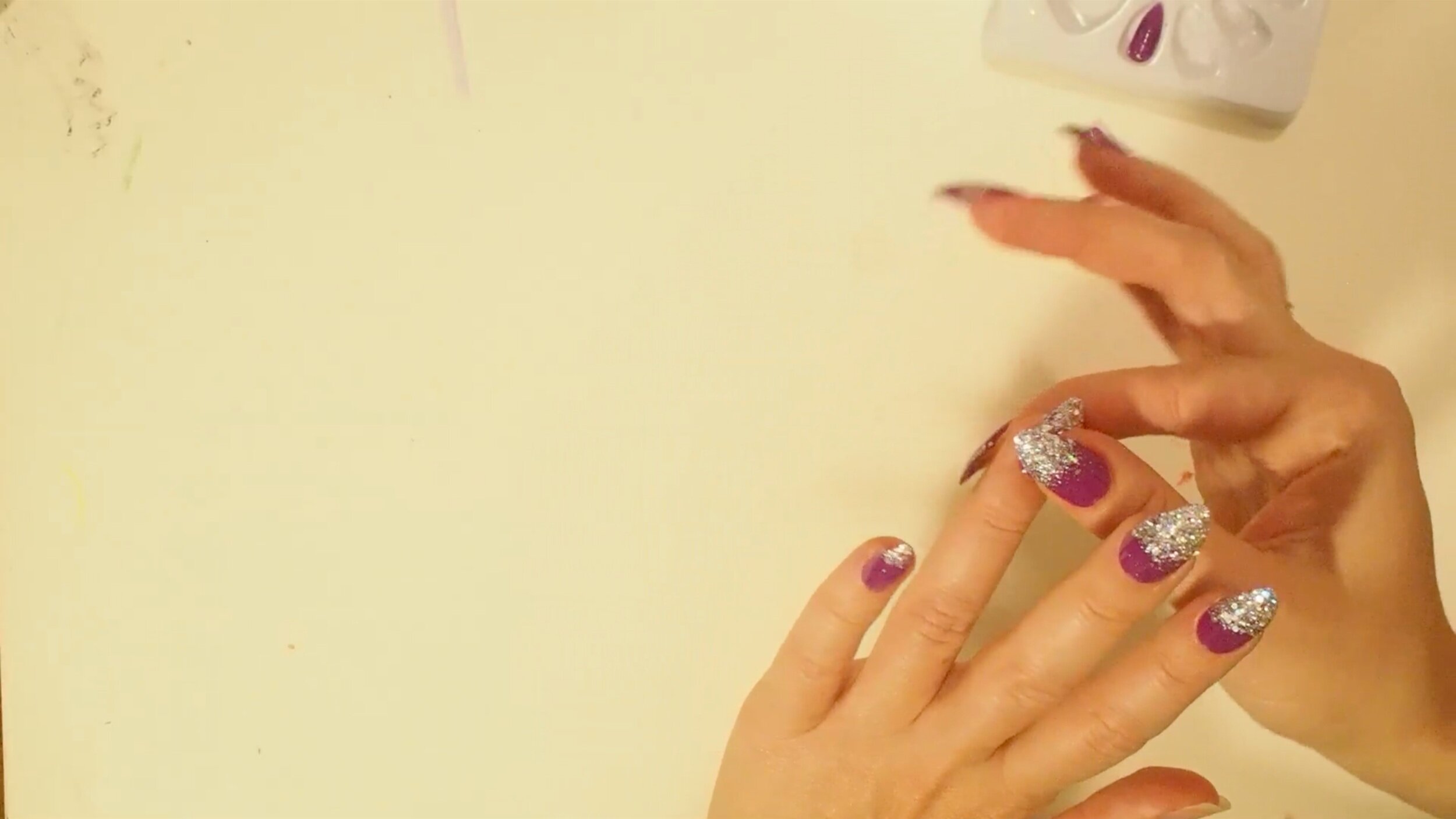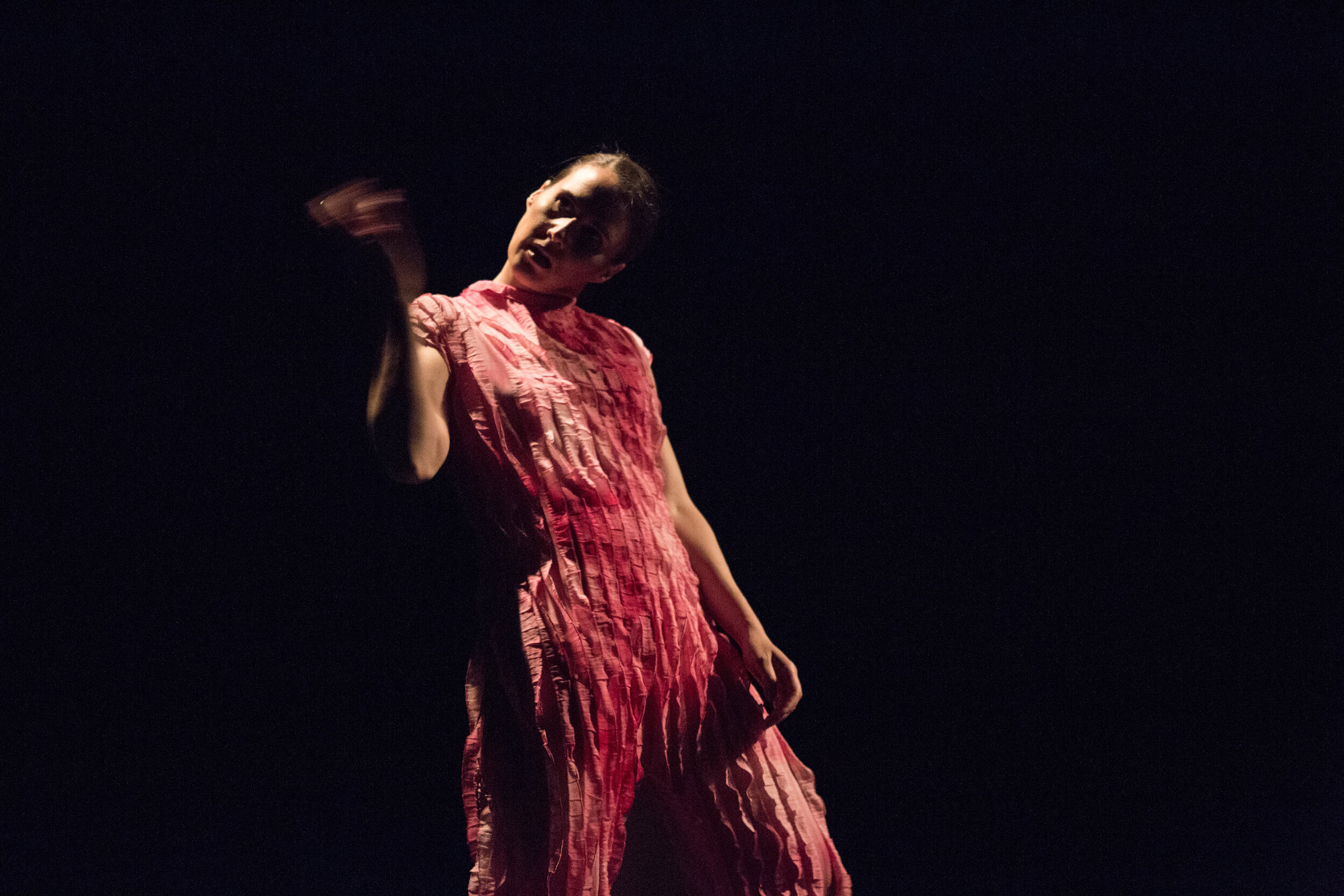Shireen Talhouni
Shireen Talhouni is an artist and choreographer from Amman, Jordan. She considers the body to be “a sensory machine that absorbs everyday experiences happening in the environment.” Her job, as she sees it, is to respond in a way that reveals something about those experiences.
We talked via video call in January 2021. It was a conversation that led us from feminine beauty, and how fakeness can be both power and weakness, to relying on the body as a medium for art work, through to the audience, and who they are.
Let's start with ASMR as you were making ASMR videos when we first met during a residency. ASMR stands for Auto Sensory Meridian Responses – or tingling in the body. How does that fit into your practice as an artist?
The first time I’d ever made an ASMR video was in the residency I did with Cel del Nord. It was of me putting on fake nails and whispering. They weren’t finished products, they were more like a process.
I’ve been recording myself wearing the nails and moving. I don’t really have to choreograph something, it’s a mood. And I’m starting a series of films, to document performances I’m setting up in shop windows in Amman, where I live. Eventually I want to turn the sound into a soundscape, working with some musicians. That’s the plan.
How did you find out about ASMR?
It was after watching mukbang (videos of people eating). I was really fascinated about why the mukbang eaters were whispering, and I started following the hashtag #ASMR, and realised it’s a whole universe – not just food. I started to notice how it made me feel. It actually calmed me down. People think it’s like going back to the womb, you know, you feel really secure, and somehow very trusting, and it gave me goosebumps. I feel like my nervous system calms down when I watch. It’s very strange.
But my fascination with beauty paraphernalia comes from somewhere completely different. I just noticed that lots of ASMR videos were about nails and make up. And then I started remembering that if I’d had my hair done in a hair shop, or I’d had my makeup done, I got the same ASMR feeling. It’s like someone is paying a lot of attention to you.
The beauty stuff has a start point of its very own, doesn’t it?
Yeah – I was living in London and Barcelona for most of my twenties, and then I moved back here to Amman in my thirties. In London there isn’t any pressure to look immaculate. Whereas here, there are so many beauty salons – so many! It’s crazy. Every street has at least five! All the girls do their nails, everyone does their eyebrows, does waxing or sugaring – like, everyone does it. So the way we look after our bodies in a Middle Eastern culture connects us. And also the way in which you’re feminine, too. Most of the time, if you go on an outing, you really dress up. That’s why here are so many beauty salons in this city. You go in any one of them and ask them to do face and hair-up for a night and they’ll do it. Most of the time they give you hairspray up to here (she gestures inches above her head). It’s very extra!
And I started to notice all this when I moved back, not in a good way or in a bad way, just the difference between here and where I had been living in London. To be ultra feminine felt weird to me, and as I wondered about it almost felt like being feminine was a performance. Almost like drag, you know? You wear your femininity, and it makes you feel bigger – this persona.
This led me to questioning, who is creating the rules about how we’re supposed to be beautiful?
Photo Credit Shireen Talhouni
And did you come to any conclusions?
Well, there are the Kardashians on a more global scale, but for us in the Middle East it’s really the popstars, and you can’t really be a famous popstar if you don’t have plastic surgery and you don’t look ultra feminine. So the question then becomes, are they influencing beauty standards or are the beauty standards influencing them? I’d think about a woman – a popstar – who is not a big persona until she puts on all her stuff.
So, the physical body changes the mental state...
Yeah! And so I became fascinated with what that did to me. And I wondered, do all women feel that if they wear lots of makeup? Are they all performing on some level? Initially I was very quick to reject it. But then I stepped back and thought, be honest with yourself. I only rejected it because it wasn’t me being authentic. When I dress up like that I’m not my “real self”. Most people celebrate the natural, don’t they.
But there’s so much pleasure and strength in fakeness! And to embrace it is powerful. Even if people find it tacky or narcissistic there is something interesting there, a very performative quality…
There’s a photo of you after you’ve been to a salon. Do I remember it right, that you told them that you were going to an event and needed beautifying, but you weren’t really going anywhere? That’s a level of performance in itself.
That’s right, I wasn’t going anywhere. I just told them to “make me beautiful”.
When I got home I just took everything off because I couldn’t bear it! A lot of women will dress up like that and they will look like that the whole day. But for me, no. I just … I went home in the car and my sister started laughing at me, and I took everything off! (laughs).
Photo Credit Shireen Talhouni
Were you surprised that your sister laughed?
No, because to be honest I looked a bit ridiculous. It was very extra. In the end that’s what’s interesting. For some people something is beautiful and for others it’s not. The idea of something being tasteful, and of what tasteful is for different social classes and cultures… I don’t want to make any judgement about it. I want to pose it as a question. That’s why I put myself in these situations.
And it’s in these situations that Jawaher comes out? Jawaher is your hyperfeminine alter ego.
Yeah, she’s what comes out when I put all that stuff on. When I am being Jawaher I am interested in not looking like myself. The first time I did it as a performance I was so intrigued by how little I looked like myself, and it was that intrigue that brought her out.
Photo Credit Shireen Talhouni
And the more I do it, the more I recognise aspects of the character that already exist in me. When I perform I’m so much bigger and more uninhibited, and more daring than I am in my normal life, and a lot more feminine. So I don’t know if all this stuff is suppressed, so it has to come out in this big, extra way before I can process it and integrate it into what my identity really is.
I grew up with a mother who was really fabulous, but tasteful. So I feel like Jawaher is a reaction to how I was brought up (laughing). She’s all of the outfits I was never allowed to wear, and … I don’t want to say vulgar because I don’t find it vulgar …. but I don’t really know how to describe it.
It’s interesting that it’s difficult to find the words for it. Because, the words that you want to use, that I would understand, feel demeaning. But why?
The thing is, I feel like a lot of people would find Jawaher tacky – tacky, vulgar, extra and all those words that are also associated with popular culture and mass media.
She is an intersection between hyperfemininity and a clown – it’s so over the top it’s almost funny. How far can I take it? How big can my hair get? How much makeup could I really wear? When I am Jawaher I feel really different, and I feel sensual, but I feel funny. It’s a caricature.
And then on some level I worry that I am just making fun of someone – a person that I am not. So there is that part to it too.
When does something move from sincerity to caricature? There is an amount of makeup that for one person is fine, but what rule says that for another person it’s too much?
Well that sums up why I do anything. You know?
In London, a woman would barely wear any makeup normally. Even if I were, for example, to go to a wedding in London I wouldn’t have worn a lot of makeup. But here you would be really judged! Across all economic classes, you would be completely judged if you didn’t put a ton of makeup on to go to a wedding.
Photo Credit Hiba Judeh
So, when you are Jawaher you are exploring the limits of femininity, and of sincerity and also of taste.
Right. I was an architect – and architecture is a very tasteful discipline, very male dominated, and I don’t know if Jawaher would really fit into an architecture practice (laughs).
So, from architecture to now, what was your journey?
I spent a decade doing architecture, and I got a job at an amazing practice, and it should have been great. All around me, other people were so happy doing their jobs. But for me something was wrong. A part of me felt that sitting in a chair listening to really amazing music and drawing toilets was boring.
Outside of work I was doing martial arts – muay tai and jiu jitsu – at a really cool gym. I’m not a violent person, but when we started sparring I found it really poetic because I had to think on my toes and improvise. Somehow being faced with physical violence made me feel alive. I made peace with the fear of violence and I wanted to move more.
I was going to a lot of dance performances and I started thinking to myself (Shireen laughs and feigns nonchalance) ‘I could do that’. So I quit my job, started exploring making films and thinking about what I wanted to do.
That’s daring!
It was a weird time. The Arab Spring was happening. I watched the fall of Mubarak on my computer at work and there was definitely a feeling of elation, when that happened. Me and some Egyptian friends that were living in London at the time, we all felt a confidence – a belief – that something could be different. It sounds cheesy but it definitely made me feel like “Screw it, I’m going to do what I love!” Like, life is too short not to.
And by making short films I got into the Laban. I didn’t have dance experience but one of the teachers took a chance on me. She liked my films, and so I got in. I loved the building, it was a Herzog and de Meuron building.
Photo Credit Shireen Talhouni
Photo Credit Hiba Judeh
And since then your body has become the focus of your work?
Yes, very much.
And how does that make you feel about your body?
Grateful for the relationship I’ve discovered with it. I’m very aware of the wear and tear, and the fact that we live temporarily in our bodies. It’s definitely something that’s always in the back of my mind. I love my body but I’m afraid of it at the same time.
Afraid of it letting you down?
Yes! Do you relate to that?
I relate to sometimes feeling like you are in your body, and sometimes feeling that you are your body. When everything inside your body is going well you and it share a oneness, and when something hurts or isn’t working you feel like you are in the body, as if it’s separate.
Well, I oscillate between these two things a lot. But when i’m actually dancing I’m very connected to my body – improvising with it, you really feel it. But ageing too, I think about that.
Maybe that’s another reason I’m really fascinated with beauty. Because you see all these women and they really change themselves. It’s very dramatic. They maximise the use they can get out of it to become successful – I mean physically altering their bodies through surgery.
Photo Credit Hiba Judeh
Would you ever have cosmetic procedures?
Not at the moment. It’s not important to me as part of my lifestyle. But I am fascinated with the idea that it’s a lot of plastic.
I started playing with all these filters on Tik Tok and Instagram. You know they banned filters that are designed to alter your face because they started creating this body dysmorphia?
I read about that! I’m interested in your relationship with social media because of the way it creates an alternative audience
Traditionally for you, as a performer, a body performer, and a choreographer, who is your audience?
Traditionally my audience is in a theatre or an art gallery. I create an event, and I invite people and whoever comes to watch is an audience and whatever I do is a performance. But what I’m exploring with Jawaher is, what is performance? Am I performing for other people or is the practice of performance there for me to answer questions for myself? Questions such as, why do I feel a certain way when I go into these beauty salons?
Could the beauty salon serve as a place to perform, you mean?
Yeah, well, the amazing thing about beauty salons is that they’re open spaces for women. Women are not wearing any hijab – a lot of the time they’re not wearing much at all – and the conversations that happen when they’re doing their nails are so open. That’s why I started exploring this idea of performing in a shop front or something. You know, a passer by is seeing a performance in everyday life.
It’s a meeting of worlds, perhaps.
Right. It comes from my architecture education I think, thinking about Situationists. When I was studying I was very inspired by 1968 in Paris. Performance was something they used as a way of exploring the city, and this really stuck with me. After I switched to dance it was really there – how you can inhabit cities, and the difference between doing and performing. it’s such a big question. I still can’t answer it!
Photo Credit Shireen Talhouni
But Jawaher is somewhere there, in that. Because, for example, me going to the beauty salon doesn’t feel like a performance. But I’m subjecting myself to someone’s ideas about the social construct of beauty and I’m allowing that person to alter my body. So, in a way, is this a performance?
And I like that relationship between normal and ‘everydayness’ and how it can be a performance. That’s why it’s interesting for me to leave the theatre and connect more to the city because an intervention can shift reality a bit.
And the audience that you reach are very different in that context, to the ones that decide to go to the theatre?
Yeah. Sometimes it’s more poetic because they’re approaching what you’re doing from a really fresh place. Not people who are used to going to art galleries, or performances all the time. They don’t have the baggage of what they already know. It’s normally really nice.
Photo Credit Shireen Talhouni
They’re not expecting a performance of any kind.
No. It’s a bit scary, because there isn’t really a boundary. When I’m looking for a place to do my installations, looking for shop windows, a lot of them are right there on the street, and I’m not sure I’d have the courage to perform there. When you’re in a theatre, or in a gallery space, there is a kind of invisible separation. And that separation gives you courage, and I suppose that’s why you can be uninhibited and perform, because you know you’re in a safe space. You don’t have that when it’s a site specific work.
Do you think all these ideas would have worked just as well if you were still in London?
No way. When I finished studying dance and I was living in London, it was very easy to carry on working because there were a lot of institutions, and there were a lot of people doing art, and making a dance scene. When I moved here there wasn’t much – really barely anything – and I don’t know whether Jawaher would have come out had I stayed in London.
Right, because you’ve had to make your own environment for performance.
Yeah, and also I wouldn’t have been confronted with this kind of topic, so much. You’re not so confronted with this hyper-femininity there.
Read more about Shireen Talhouni and watch some of her films at shireentalhouni.com












